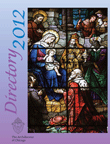People are different
People are different … no doubt about it.
I say there are two kinds of people in the world: those who walk into a room with a TV and turn it on, and those who walk into a room with a TV and turn it off.
But I don’t think that’s what most people mean when they talk about diversity. Diversity is more about the things you can see—skin color, or style of dress—and hear—languages and accents.
We’re blessed to live in one of the most diverse cities in the world, with people who have milky white skin and those who are dark as ebony, and everything in between. Here in the Archdiocese of Chicago, Sunday Mass is celebrated in 25 languages besides English.
That diversity is played out in daily life, even in our own Brownie troop, which includes girls of many ethnicities—and many with several different nationalities in their heritage. One of our Brownies has Down syndrome.
So when I asked Caroline last year if she wanted to write something for a Girl Scout essay contest on diversity, she asked what that meant. When I told her it was about meeting different kinds of people in Scouting, she said, “Who’s different?”
And she meant it.
To Caroline, there isn’t a difference between her friends who speak Spanish at home and those whose only language is English, between those who have different skin colors or even different religions.
To her, the differences are between the “girly girls” and the “tomboys,” those who want to play sports and those who want to play dolls. But those distinctions are fluid, and not meant to exclude. Caroline has pointed out that sometimes, she feels that there are two sides to her personality.
That gift of inclusiveness, I fear, will not last too much longer.
Last year, she gave me a social breakdown of her class, of who belonged to which group, and who led each group. When I asked which group she fit in, she listed three or four, allowing that she spent more time with some than others. And she made it clear that while there were groups (she wouldn’t call them cliques), each group got along with the others. One group was more into sports, she said, another more into art.
The time she spent with them seemed directly related to how much she liked the activities they did most.
That fits into the scriptural image of many parts, one body in Christ. We each have a role to play, and our job is to play our given role to the best of our abilities.
When I asked her if she had ever met anyone she just didn’t like, she thought for a minute, sighed, and said, “I suppose I’ll have to go through that someday.”
For her sake, I hope that day is a long time coming.
Martin is assistant editor of the Catholic New World. Contact her at [email protected].













